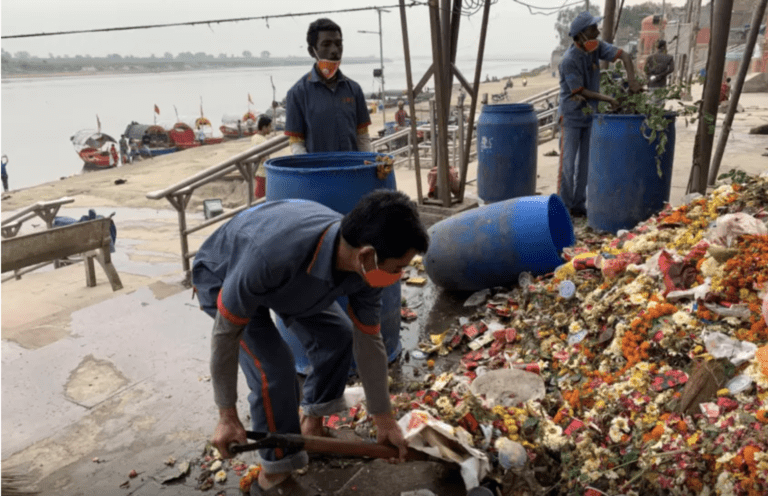Hindu worshippers have been filling the Ganges with around 8 million tonnes of flowers they had offered to temples. Entrepreneur Ankit Agarwal started this company, Phool.co, to tackle the issue of removing floral waste from India’s holy river. Agarwal’s team of 100 people recycle the flower waste because “all the pesticides and insecticides that were used to grow these flowers mix with the river water, making it highly toxic,” he told Reuters TV.
Phool.Co Plan Of Action To Make A Change
Argarwal’s team consists of mostly women who were either unemployed or worked as manual scavengers. Now they pluck out the discarded flowers near the Ganges river bank or pick them up from the temples to be recycled into paper, incense, and water colours. The women in their PPE now sit at wooden tables, their workstations, and roll a brown paste into thin cylinders as part of their process to recycle the flowers. Agarwal states he’s working on other biodegradable solutions such as turning the flower waste into a green alternative to styrofoam that can decompose in less than a month.
Argarwal has also taken measures to stop people discarding the packaging from the incense sticks his company makes into the Ganges by not including imagery of the Hindu Gods, instead infusing the papers with basil seeds, a plant attributed with holiness in hinduism.
“The concept was, once we use these products, please sow the packaging and a Tulsi (basil) plant would grow out of it and the packaging really helped us establish our brand,” he said.
Benefits Of Phoo.Co Initiative
Phool.co has received investment from the social arm of the Tata business group, which benefits his mostly female staff financially as well as their social standing. Now they have work that commands respect, clearing the sacred Ganges.
“People see me as an independent woman who can do a job and also run her household. So, this has brought a change in my life,” said one, Sujata Devi.
Removing waste from the rivers not only benefits the impact on the ecosystem, but also the health of the population. Agarwal said, “All the pesticides and insecticides that were used to grow these flowers mixes with the river water, making it highly toxic, which is one of the leading causes of hepatitis, cholera across India and Bangladesh, affecting lives of more than 420 million people.”



